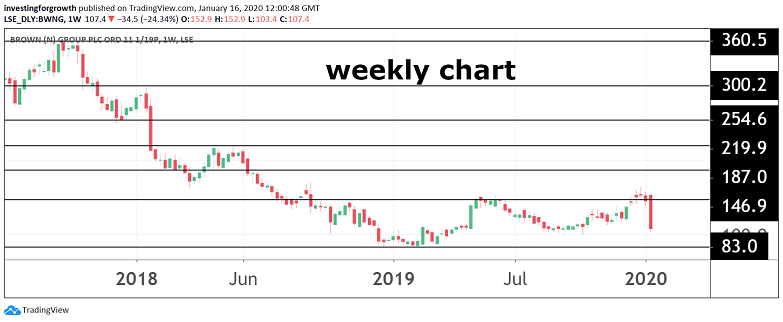Are N Brown shares now ‘deep value’ after 27% crash?
Backed in the City as a value play for the year ahead, today’s plunge is forcing a rethink on targets.
16th January 2020 12:40
by Graeme Evans from interactive investor
Backed in the City as a value play for the year ahead, today’s plunge is forcing a rethink on targets.

Tipped by some at the start of 2020 as an income and value stock to watch, online retailer N Brown (LSE:BWNG) brought its recent share price charge to an abrupt halt in all too familiar fashion today.
The 25% reversal in shares to 106p extends the snakes-and-ladders performance of a stock that produced total returns of 79% in 2019 following a surge of about 60% since October.
Talk of a more sustainable recovery at N Brown had been growing louder in the City, with broker Peel Hunt last week sensing “deep value” in the shares underpinned by an attractive 4.5% yield. “N Brown should be nailing it,” was their assessment of the retailer, based on a strong niche and now largely digital business model.
That optimism has been shattered by today's warning that 2020 profits will be in the range of £70 million and £72 million, against the consensus of £78 million to £84.1 million.
The company admitted trading conditions were highly promotional, but that's only part of the reason for the warning. After all, digital product revenues still managed to rise 2.5% in the 18 weeks to January following strong growth at Simply Be and Ambrose Wilson.

Source: TradingView Past performance is not a guide to future performance
The biggest factor behind today's collapse concerns the financial services arm, which recorded a 4.6% drop in revenues as a result of regulatory-driven changes to the way it manages its debtor book. Lower balances and associated interest income have been accompanied by a fall in administration fees as fewer customers entered into arrears.
To make matters worse, new rules on credit limits and persistent debt due to come into force in March and December respectively will have a significant impact on the size and shape of N Brown's debtor book. It intends to introduce new financial products, but admits that the situation will also result in 2021 profits being at the same level as this year's.
House broker Shore Capital called the reduction in financial services guidance as “surprising and unwelcome”, prompting it to cut its 2020 profits estimate by 16% to £70.2 million and 2021's by 20% to a similar level. This is despite “notable work” in reducing the cost base.
Shore's retail analyst Clive Black said: “We were anticipating a somewhat more conventional update from N Brown than has emerged today.” He forecast an unchanged final dividend of 7.1p going forward, leading to a yield of 5% based on the start of trading today.
Peel Hunt cut its price target from 200p to 150p and removed its “buy” recommendation, despite a lowly price/earnings multiple of about seven times. They had previously predicted a return to free cash flow generation from this year.
The last time N Brown dealt a major blow to shareholder confidence was in October 2018 when it took the decision to rebase its dividend. Since that 50% cut, CEO Steve Johnson has made progress in boosting the resilience of the company's core offer, leading to what he described today as an “encouraging” peak trading period.
Johnson said a strategic review due to be announced alongside full-year results in April is likely to deliver a tighter brand portfolio, sharper focus on product and more appropriate cost base.
He added:
“At the same time, we will continue to proactively address the accelerating and cumulative external factors which are anticipated to reduce the size of our financial services business over the next two years.”
These articles are provided for information purposes only. Occasionally, an opinion about whether to buy or sell a specific investment may be provided by third parties. The content is not intended to be a personal recommendation to buy or sell any financial instrument or product, or to adopt any investment strategy as it is not provided based on an assessment of your investing knowledge and experience, your financial situation or your investment objectives. The value of your investments, and the income derived from them, may go down as well as up. You may not get back all the money that you invest. The investments referred to in this article may not be suitable for all investors, and if in doubt, an investor should seek advice from a qualified investment adviser.
Full performance can be found on the company or index summary page on the interactive investor website. Simply click on the company's or index name highlighted in the article.